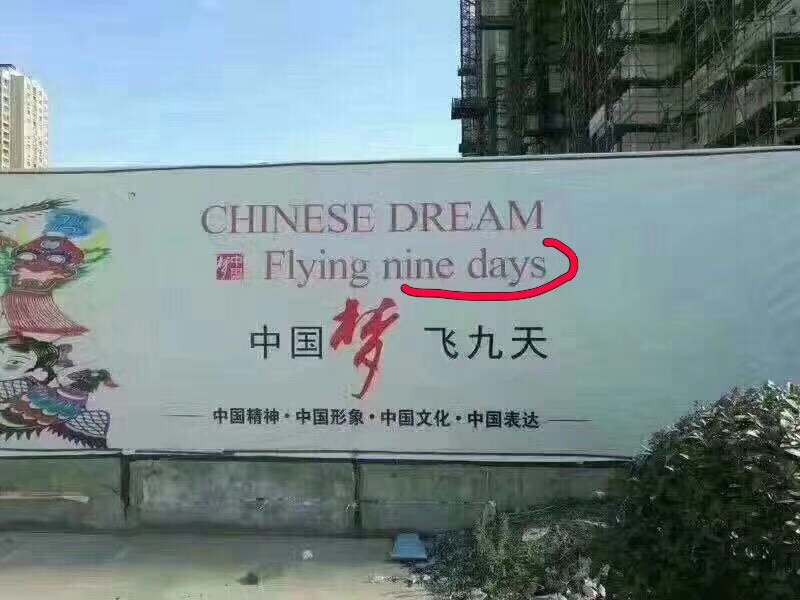Ninth heaven
« previous post | next post »
From Perry Link:
Not good! Inauspicious! The China Dream will only fly for nine days, then it's all over. Finished!
But that's based on the mistranslation of tiān 天 as "day" instead of "heaven". It can also mean "sky; God; deva; weather; nature; season".
The translation should be something like this:
Zhōngguó mèng fēi jiǔtiān 中国梦飞九天 ("China Dream, soaring to the empyrean")
The "ninth heaven" ( jiǔtiān 九天) is the most exalted heaven in Chinese cosmology. In Jewish and Islamic theology, it is the "seventh heaven" that is the most exalted level. But, in the books of Enoch, there is also a "ninth heaven", called Kuchavim (Heb.) where the heavenly homes of the twelve constellations, of the circle of the firmament, are located. "In examination of the word 'homes' in 2 Enoch 21:8, this passage could be referring to the positions of the twelve constellations, namely the constellations of the zodiac". (source)
"Fēi jiǔtiān 飞九天" ("flying / soaring to the ninth heaven / empyrean") may be based on a quotation from Mao Zedong, but I have not been able to track it down. Nor do I know how "cloud nine" fits in to all this.

Ethan said,
April 19, 2018 @ 8:04 pm
I am puzzled how this particular mistranslation would occur. Are there contexts in which 天 really does signify "day"?
WSM said,
April 19, 2018 @ 8:10 pm
I think classically it was referred to as 九霄 where 霄 means "cloud".
Victor Mair said,
April 19, 2018 @ 9:21 pm
@Ethan
tiāntiān 天天 ("every day; day by day; daily")
měi (yī) tiān 每(一)天 ("every day")
nà yī / nèitiān tiān 那一天 ("that day")
Keith said,
April 20, 2018 @ 12:44 am
@Ethan
To Dr. Mair's reply I'd like to add: Not only can 天 signify day–it is the most common way to signify day, especially when counting days. In fact, if one needed to express the idea of flying for nine days, 飞九天 is the most natural formulation. Examples (ignore realism):
从北京到重庆要飞三个小时
Cóng Běijīng dào Chóngqìng yào fēi sān ge xiǎoshí
From Beijing to Chongqing requires flying three hours
It takes three hours to fly from Beijing to Chongqing
从北京到重庆要飞九天
Cóng Běijīng dào Chóngqìng yào fēi jiǔ tiān
From Beijing to Chongqing requires flying nine days
It takes nine days to fly from Beijing to Chongqing
B.Ma said,
April 20, 2018 @ 1:02 am
"Day" is the first concept that would come to mind when I see the character 天 on its own.
"Nine days" is the first concept that would come to mind when I see the characters 九天 on their own.
One shouldn't be surprised when machines translate things literally…
Neil Kubler said,
April 20, 2018 @ 9:59 am
Even in modern Mandarin, there is a fairly common phrase 九霄雲外jiu3xiao1yun2wai4 "beyond the clouds of the 9th heaven" that basically means "far away."
Mario Naiefjongen said,
April 23, 2018 @ 12:08 am
九天 as 'ninth heaven' has been used in as early as the Tang poetry. Li Bai wrote the famous line '疑是銀河落九天' in his poem, 望廬山瀑布. Mao Zedong also used it in a poem: 可上九天攬月,可下五洋捉鱉' (水調歌頭·重上井岡山). Although it has the similar connotation as 九霄, or 九重霄, but they are, after all, different words. And I think here it borrows more the connotation by Mao to emphasise what will power could achieve. This is plausible since Xi is proud to be ideologically Mao's heir.